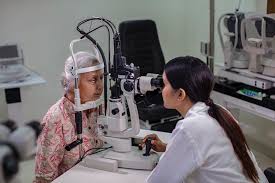
DIPLOMA IN OPTHALMIC ASSISTANT (2 YEAR)
Diploma in Ophthalmic Assistant (2 Years)
📚 YEAR 1 SYLLABUS (FOUNDATION LEVEL)
1. Human Anatomy and Physiology (with focus on Eye)
- General anatomy of the human body
- Eye anatomy: cornea, retina, lens, optic nerve, etc.
- Physiology of vision
- Eye muscles and movements
2. General and Ocular Microbiology
- Introduction to microbiology
- Common eye infections
- Sterilization techniques
- Infection prevention in eye care
3. General and Ocular Pharmacology
- Basics of pharmacology
- Types of eye drops and ointments
- Drug dosage, storage, and administration
- Contraindications and side effects
4. Basic Ophthalmic Techniques
- Visual acuity testing (Snellen chart, near vision charts)
- Color vision tests
- Pinhole test
- Use of autorefractor and retinoscope
- Eye bandaging and irrigation techniques
5. Medical Ethics and Patient Care
- Ethics in ophthalmic practice
- Communication skills
- Patient history taking
- Eye care in special populations (children, elderly)
6. Ocular Diseases – Introduction
- Conjunctivitis
- Cataract (overview)
- Refractive errors
- Stye and chalazion
🧠 YEAR 2 SYLLABUS (ADVANCED LEVEL)
1. Ophthalmic Instruments and Equipment
- Slit lamp biomicroscope
- Direct and indirect ophthalmoscope
- Tonometer (Schiotz and Applanation)
- Keratometer, Perimeter, A-Scan/B-Scan
- Maintenance and sterilization of instruments
2. Optics and Refraction
- Basics of optics
- Types of lenses
- Trial frame and lens set usage
- Prescription reading
- Common refractive errors: Myopia, Hypermetropia, Astigmatism
3. Ocular Pathology and Diseases
- Cataract (types, stages, management)
- Glaucoma (types, diagnosis)
- Corneal ulcers and infections
- Retinal diseases (retinopathy, detachment)
- Eye trauma
4. Surgical Procedures and OT Assistance
- Pre-op and post-op patient care
- Assisting in minor and major eye surgeries
- Instrument handling and sterilization
- Dressing, suture removal, eye drop instillation
- Patient preparation for cataract surgery
5. Community Ophthalmology
- Eye care in community settings
- Vision screening in schools and camps
- Prevention of blindness programs (NPCB)
- Eye donation and awareness
6. Clinical Internship / Practical Training
- Posting in outpatient department (OPD), operation theatre (OT), and eye camps
- Practice of refraction and visual testing
- Instrument sterilization and OT setup
- Case presentation and report writing

